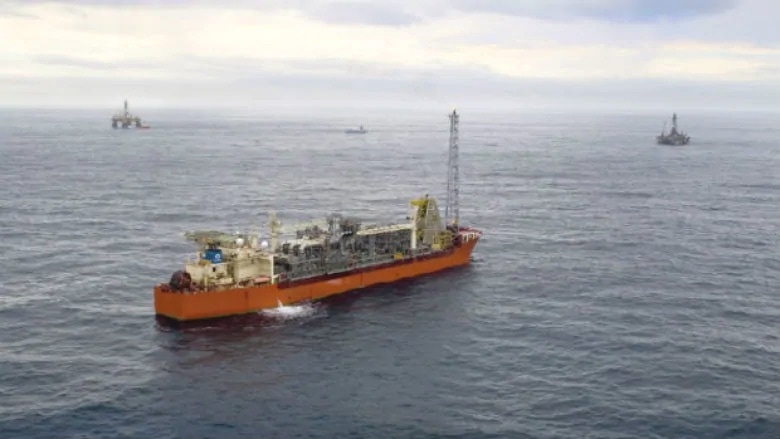
KJIPUKTUK (Halifax) – An oil spill off the coast of Newfoundland happened last Friday, and as of this morning no efforts have been made to contain the spill.
The company responsible for the mess, Husky Energy, doesn’t even know if more oil is leaking into the ocean beyond the record-setting 250,000 liters that it has so far acknowledged.
Ocean swells of up to seven metres are preventing any underwater examination, a Husky spokesperson explained to the CBC on Saturday.
The leak, from a flowline to the SeaRose FPSO, a vessel stationed about 350 kilometres off the Newfoundland coast, happened on Friday while crews were preparing to restart production.
Husky and its SeaRose were in trouble before. In 2017 the same well was temporarily shut down after it was discovered that Husky violated protocol regarding a near miss collision with an iceberg.
Meanwhile, Bill Montevecchi, a marine biologist who studies seabirds in the area, told the CBC that he is concerned about the tens of thousands of murres and dovekies in the area that may be at risk.
There’s a lesson here for Nova Scotia.
Seven meter high waves are not exclusive to Newfoundland’s offshore. The Northern Atlantic is rough everywhere. The only thing that makes Nova Scotia’s offshore stand out in comparison is that the several of the areas designated by the province for exploration are deeper.
“Nobody has ever drilled in waters so deep, in an ocean so rough, and in an area so close to some of the most important spawning grounds on earth. I think that it’s just the height of folly to think about risking these spawning grounds without even having the appropriate safety measures on site that they require in other progressive countries,” Colin Sproul, a spokesperson for the Bay of Fundy Inshore Fishermen’s Association told the Nova Scotia Advocate in March of this year.
There are other parallels between Newfoundland and Nova Scotia, beyond sharing an unpredictable ocean. We also share a very weak regulatory regime.
Montevecchi suggests that Husky Energy had no business restarting production while a storm was still raging.
“What we’re seeing is not an accident. It is the outcome of weak regulation,” he said. “The platform, which had shut down presumably because of storm sea conditions on the Grand Bank, was then going back into operation at a time when clearly it should not have been doing that,” he tells the CBC.
He blames the Canada-Newfoundland and Labrador Offshore Petroleum Board (CNLOPB) for providing weak oversight and being beholden to the industry.
Nova Scotia’s regulator, the Canada-Nova Scotia Offshore Petroleum Board (CNSOPB), mirrors its Newfoundland counterpart in more than name, and has faced the same criticism.
How can you regulate an industry when your board is filled with industry representatives, and when your mandate is to both facilitate and regulate that industry, critics ask.
BP may have left Nova Scotia’s offshore empty handed for now, but Energy Minister Derek Mombourquette said this week he remains “very optimistic” that BP will return and other companies will start their own exploration.
Unfortunately, Mombourquette may well be right. That’s why we need a moratorium now.
With a special thanks to our generous donors who make publication of the Nova Scotia Advocate possible.
Subscribe to the Nova Scotia Advocate weekly digest and never miss an article again.




I live in Newfoundland – no action, no comment from any party leader, 48 hours in.
We’re betting the (already sold) farm on Big Oil and Iron for cars in China – climate change is willfully ignored.
Boasting about new deals for Oil exploration, while over-taxing residents to pay down the un-pay-downable Muskrat Falls.
Hopeless reckless willful ignorance from the country with the highest standard of living in the world.
Tell your grandkids that Newfoundland didn’t try to stop anything, except payments to Quebec.